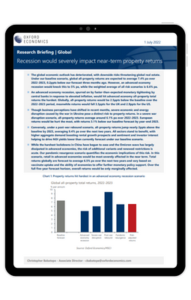Recession would severely impact near-term property returns

The global economic outlook has shifted drastically in the three months since our last global real estate scenario research briefing. The war in Ukraine introduced a significant amount of uncertainty into geopolitics and the outlook for the global economy, with downside risks accumulating since then. Over the past few months, we’ve gradually downgraded our global economic growth forecast, while upward revisions to the global inflation forecasts have seemingly been unremittent. Our most recent June flash Global Risk Survey suggests a shift in business perceptions about the key risks to the global economic outlook. While still pervasive, the war in Ukraine is no longer the prime concern of the Oxford Economics’ clients canvassed. Instead, it’s been supplanted in the latest survey by the risk of an advanced economy recession, on the back of quickening central bank tightening (Chart 2).
What you will learn:
-
The global economic outlook has deteriorated, with downside risks threatening global real estate. Under our baseline scenario, global all-property returns are expected to average 7.4% pa over 2022-2023, 0.2ppts below our forecast three months ago. However, an advanced economy recession would knock this to 5% pa, while the weighted average of all risk scenarios is 6.6% pa.
-
An advanced economy recession, spurred on by faster-than-expected monetary tightening by central banks in response to elevated inflation, would hit advanced economy all-property total returns the hardest. Globally, all-property returns would be 2.5ppts below the baseline over the 2022-2023 period, meanwhile returns would fall 3.5ppts for the UK and 2.9ppts for the US.
-
Though business perceptions have shifted in recent months, severe economic and energy disruption caused by the war in Ukraine pose a distinct risk to property returns. In a severe war disruption scenario, all-property returns average around 6.1% pa over 2022-2023. European returns would be hurt the most, with returns 3.1% below our baseline forecast by year-end 2023.
Tags:
Related posts

Post
Global Private equity real estate fund maturities spur asset sales
We expect the significant increases in fund maturities, spurred by capital raised over the past decade, to exert upward pressure on the rate of asset disposals as the funds approach the end of their lifecycles.
Find Out More
Post
Four themes are shaping US real estate markets
This year is set to be a turning point for commercial property markets in the US. A gradual easing of inflationary pressures alongside a steady, if unspectacular, year for GDP and employment growth should help to ease the market through the final leg of the post-Covid adjustment. But there are four important themes market participants will need to understand to navigate the short and medium term successfully.
Find Out More
Post
Infographic: Key macroeconomic risks impacting global real estate performance
Continued economic growth will help stabilise commercial real estate yields and values before pricing slowly begins to recover next year. We expect global all-property total returns to average 5.3% per year over 2024-2025 in our baseline scenario. However, there are still upside and downside risks that real estate professionals should watch out for. In this infographic, we outline these risks and their impacts on property value.
Find Out More